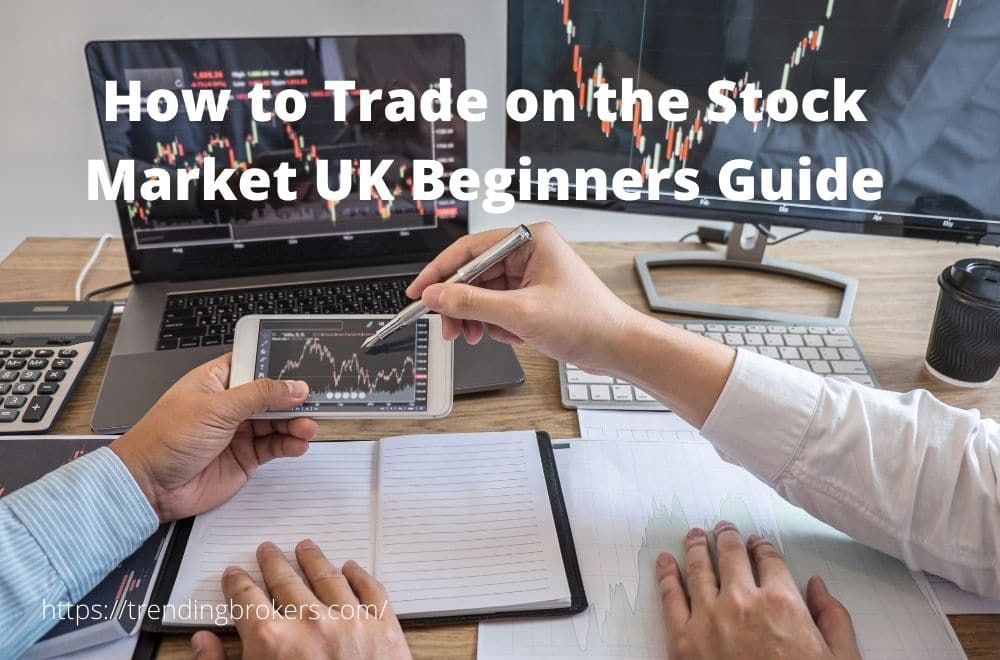Trade on the stock market UK has the potential to make you a lot of money. And an important aspect of the stock market is inconstancy and irregularity. You may witness profits and losses, ups and downs, as a stocks trader.
Want to learn how to trade on the stock UK but aren’t sure where to begin? You’ll find information to assist you with the procedure if you read forward in this guide on starting trading stocks UK. This post will discuss trading stock strategies, a step-by-step how-to guide on trading stocks, and a general summary of where to trade stocks.
What is Trade on the Stock Market UK?
A stock exchange, often known as a stock market, is a financial market where company stocks are purchased and sold. Compared to other markets, such as currency, trade on the stock market UK is usually more organized and regulated. Furthermore, rather than a broker or market maker, the biological forces of supply and demand decide the pricing of stocks and shares on exchanges.
Stock markets can be found in major cities worldwide; click here for stock market trading hours. The following are some examples of common exchanges:
- New York Stock Exchange (NYSE)
- National Association of Securities Dealer Automated Quotation System (NASDAQ)
- London Stock Exchange (LSE)
- Japanese Exchange Group (JEG)
Types of Market for Trading Stocks UK
Stocks trading refers to buying and selling shares on the secondary market. Here we are explained about both types of market.
Primary Market: Companies issue new securities and offer them to the public on the primary market. The trading transaction takes place between the issuers and the buyers.
Secondary Market: You can purchase and sell shares issued in the primary market on the secondary market. The trade takes place between the vendor and the buyer. The stock exchange or broker work as a middleman in the secondary market.
How does Trade on the Stock Market UK Work?
A stock exchange puts buyers and sellers together on a single platform, allowing them to bargain prices of stocks and shares while transferring ownership. For example, if a corporation is publicly traded, its stock is freely traded on the stock market, with the price established by investor supply and demand.
Stock traders UK acquire stocks at a low price in the hopes that the share price will grow in the future, allowing them to profit from the price rises. On the other hand, investors are just as likely to lose money if the stock price declines.
A process is used to list a company’s shares for the first time. As a corporation transitions from a private to a public company, its shares are offered to trade on the stock market UK. When investors purchase public offering stock, the company can raise capital and use it to invest in market growth possibilities. Companies can also use a SPAC to sidestep the public offering process and opt for a less expensive and faster solution.
How to Trade on the Stock Market UK?
When you have your bearings, you can begin learning to trade by following these fundamental stages:
Open Trading Account
To trade on the stock market UK, you must first open a Demat or brokerage trading account as You can’t able to trade on the stock market UK. The trading account functions similarly to a bank account in that it holds funds for trading. The securities you purchase are kept in an electronic Demat account.
Learn the Stock Market Quotes
The stock price fluctuates in response to news, fundamentals, technical analysis, and other factors. You might improve your understanding of stocks and stock markets by learning about these topics below This will assist you in determining the best price at which to enter or quit a trade.
Fundamental and Technical Analysis of Stocks
To plan trade on the Stock market UK, look at the stock’s fundamental and technical evaluations. Fundamental analysis determines a security’s intrinsic value and considers various factors such as profits, expenses, assets, and obligations.
On the other hand, Technical analysis analyses the stock based on its historical price and volume chart to forecast its future potential.
Pick your Stocks after Research
Read leading market analysts’ news, analysis, and market insights, as well as the company’s fundamentals utilizing financial measures like P/E and EPS.
Select a Product
On share price changes, you can either spread bets or trade CFDs. If you are unsure which is best for you? Read more about the differences between spread betting and CFDs in our post.
Make a Decision about the Business Direction
Decide whether you want to go long and ‘purchase’ the stock or short and ‘sell’ it based on your study. This is a case of guessing on whether the stock price will rise or fall as a result of your investigation. When it comes to short selling, be wary of trade on the stock market UK short squeeze.
Trading Strategy Selection
You can select your entry and exit points based on your trading plan after knowing the share you’re trading and the direction of the transaction. Don’t forget to implement your risk management principles as a part of a trade on the stock market Uk plan.
Determine Position Size
Open an order ticket to assume the asset’s price if the trade fits your trading plan. To control the risk of your position size, make sure to put stop-loss and take-profit orders.
Close Trade
Keep an eye on your deal and make sure it’s closed according to your trading strategy. That is unless the risk-management conditions you originally set have already closed it.
Examine and Evaluate
Consider how you trade on the stock market UK and what went well and what may have gone better. Then, to keep track of your results, make a note of your performance according to your trading plan.
To begin tracking stocks and shares, create a live account and deposit dollars to access the live market.
Types of Trading Stocks UK
To help organize the trade on the stock market UK, stocks can be divided into numerous groups. Trading stocks can include the following:
- Blue-chip stocks: These are the highest-performing equities in a given industry.
- Growth Stocks: Stocks that rise faster than the market average.
- Value Stocks: Stocks that are undervalued in the market.
- Penny Stocks: These stocks trade below £1 in the UK
- Dividend stocks: These stocks focus on paying out a high dividend yield compared to the rest of the market.
Growth stocks, value stocks, and penny stocks are three of the most interesting and frequently referenced stock categories. You can also block trade these equities, which entails purchasing and selling at least 10,000 shares at once on the stock exchange.
Growth Stocks
A growth stock is a stock that is expected to grow at a faster rate than the market average. As a result, it is a corporation growing at a higher rate than its competitors. Because they frequently reinvest any earnings to accelerate their expansion, these companies rarely pay dividends.
Growth stocks are considered on the higher-risk end of the risk spectrum. This is because they normally have a medium-sized market cap, no dividends, and a lot of money invested in their growth. They are seen as a very speculative investment compared to other options.
Growth stocks often do well during bull markets and are common in technology-related sectors like Chinese tech companies. They are frequently fueled by their desire to innovate, which allows them to outperform industry competitors. However, because of the ‘hype’ that can surround a sector or firm, growth stocks’ tremendous potential might cause them to be overpriced.
Value Stocks
A value stock is undervalued when compared to its intrinsic worth. Investors try to evaluate a company’s intrinsic value by analyzing its fundamentals thoroughly. As a result, a value stock has a fair price in relation to the company’s on-paper success. Value stocks are popular among investors because they offer regular dividend payouts and growth prospects. Find out how to value an investment.
A value stock’s price might be discounted for various reasons, some of which contribute to a stronger motivation to buy than others. Perhaps the company’s stock is undervalued because the industry is losing relevance, it has received negative news, or it is subject to stricter regulations. For these reasons, buying a value stock may not be worthwhile in the long run.
Investors who believe in the opposite of the above seek out value stocks. Future rules will be relaxed, news coverage and public opinion will improve, and the industry will become more significant. A value investor should look at macroeconomic variables in addition to a company’s intrinsic worth to estimate future growth potential.
Penny Stocks
A penny stock has a market value of less than £1 in the UK or less than $5 in the US. The thing that differentiates them from other equities is their value.
Penny stocks in the UK should be traded with caution because they can be quite volatile. However, due to the low share price, you can experience tremendous gain compared to larger equities if you choose the proper penny stock.
Methods of Trade on the Stock Market UK
You have the option of purchasing the physical share outright or trading it through a spread betting or CFD trading account. The major distinction between the two is that you don’t own the underlying asset with derivatives; instead, you trade on its price changes. You can, however, profit if the market swings in your favor or lose money if the market goes against you.
Spread Betting Stocks
There are some distinct contrasts between spread betting and other types of betting, such as:
- Tax: Unlike CFD and stock trading, spread betting is not subject to capital gains tax.
- Availability: Only the United Kingdom and Ireland offer spread betting.
CFD Trading on Stocks
CFD trading accounts differ from typical share trading accounts in a few ways. Here are a few examples:
- Stamp duty: Unlike stock trading, CFDs are not subject to stamp duty.
- Leverage: CFD trading accounts are pre-configured to use leverage, which can magnify both earnings and losses.
- Mobile Apps: For our trading customers, we provide native mobile apps.
- Reduced expenses and Low Cost: Spread betting, and CFD trading are potentially less expensive than stock trading.
Difference between Investing and Trading
The following are some of the major distinctions between trading and investing:
Time horizon for investing: This can take years or decades because the goal is long-term capital creation, whereas trading has far shorter time frames, ranging from less than a day to a few months.
Number of Traders: Because investing is primarily a buy-and-hold strategy, the number of trades is typically far lower than trading, where numerous trades are the norm.
Types of trades: Trading may comprise long and short positions to benefit from higher and lower market fluctuations, but investing normally involves solely long holdings.
Conclusion
Begin trade on the stock market UK by learning everything there is to know about financial markets, then read charts and watch price activity to develop techniques based on your findings. Stocks trading is the best way to test these methods while reviewing the results and making modifications with a trustworthy broker like ABInvesting. Finish the first half of your journey with monetary risk, which challenges you with trade management and market psychology concerns.
FAQs
Q1. How do beginners trade on the Stock Market?
Beginners do trade with the help of some steps given below:
- Open trading account
- Fundamental and technical analysis of stocks
- Understanding the Stocks quotes
- Ask expert bout trading experience
- Pick your preferable stocks
Q2. Can Stocks Trading help you in making money?
You can make thousands, lakhs, or even millions of dollars through trading. However, intraday gains are dependent on a few crucial factors: How much money do you invest in the markets daily?
Q3. What are the types of stocks?
Types of stocks are given below:
- Growth Stocks
- Penny Stocks
- Value Stocks
- Dividend Stocks
Q4. How much money is needed to trade on the Stock Market?
The amount of money required to begin day trading is determined by the securities you choose to purchase. Orders of at least 100 shares are the most common way to trade stocks.


